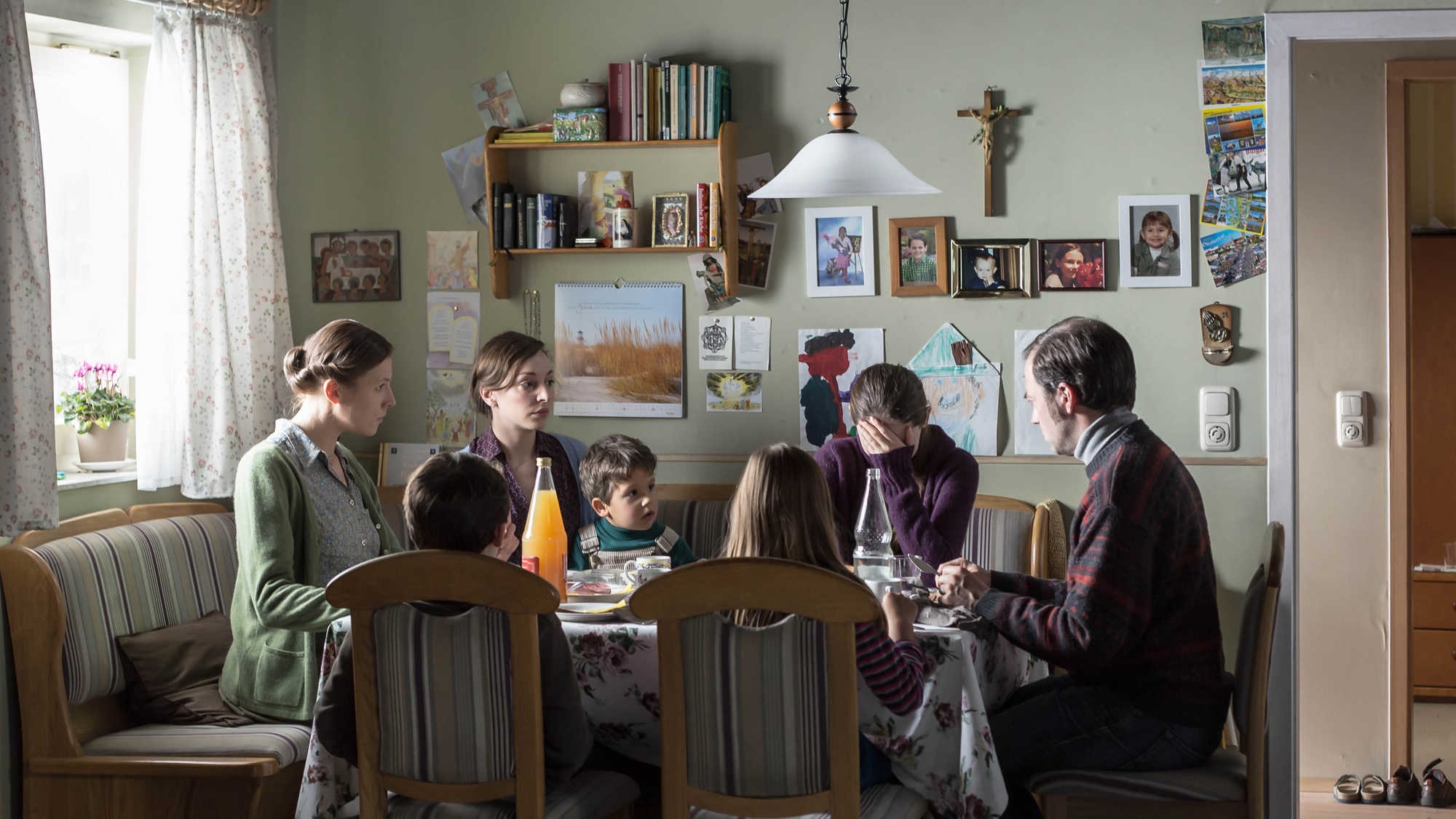There is ice at the heart of German director’s Dietrich Brueggemann’s Stations of the Cross (Kreuzweg). Winner of this year’s Berlinale Silver Bear for best script – the director wrote the film in collaboration with his sister Anna – it’s a chilling look into the psychology of extreme religion, in this case very traditional Catholicism, set in small town Germany. Formally impressive, it’s unsparing in its point of view in telling a tragic tale.
We encounter 14-year-old heroine Maria (Lea van Acken, an extremely poised screen debut) in the first scene at her final confirmation class. It’s led by the charismatic but dry Father Weber (Florian Stetter), who is drilling his future first communicants in what they have to do to become “warriors for Christ”. This battle between good and evil is almost a literal one, involving sacrifice of pleasures, and resistance against such everyday factors as “satanic music” and “impure ads and billboards”. These members of the Priestly Society of St. Paul (it’s based on the Society of St. Pius X, which rejected the liberal reforms of the Second Vatican Council, and stands up for very traditional values) are certainly into self-abnegation. Maria stays behind to ask the priest (main picture) about why God allows children to be sick; her four-year-old brother has yet to speak a word, and may be autistic. The seeds of self-sacrifice have been sown.
Maria’s home life is no less rigourous, dominated by her harridan mother and ineffectual father
The title of the film comes from Christ’s final journey – it’s also known as the Via Dolorosa or the “Way of Sorrows”, which gives a fair hint of what’s ahead – and each of the 14 scenes is sub-titled accordingly. That opening one, “Jesus is condemned to death”, runs for close on 15 minutes, and keeps a single, static shot; later scenes follow that pattern, all in single shot, although with varying, though limited degrees of camera movement. The effect is compelling, drawing the viewer in with a strictness that reflects the story we see unfolding on screen, but at the same time somehow alienating.
Maria’s home life is no less rigourous, dominated by her harridan mother (Franziska Weisz) and an ineffectual father who barely says a word in the whole film; the only adult with whom Maria has any sort of bond is the family’s French au pair Bernadette (Lucie Aron), who looks after the Maria’s three younger siblings. There’s an almost unbearable scene mid-film (pictured, below right) where the family sit down to dinner, and Maria dissolves into floods of tears, her grief almost totally ignored except for Bernadette’s sympathy.
 She has plenty of reason to cry: her school life seems normal by comparison with the repression that is home, bringing her into contact with another world. A library chat with a boy her own age, Christian (Moritz Knapp), has him asking the questions you’d expect. Would she like to come out for an ice-cream or a movie? Out of the question. She’s tempted to come along with him to his choir practise though, but their repertoire as well as Bach includes other more contemporary music.
She has plenty of reason to cry: her school life seems normal by comparison with the repression that is home, bringing her into contact with another world. A library chat with a boy her own age, Christian (Moritz Knapp), has him asking the questions you’d expect. Would she like to come out for an ice-cream or a movie? Out of the question. She’s tempted to come along with him to his choir practise though, but their repertoire as well as Bach includes other more contemporary music.
When Maria broaches the subject with her mother in the car home, obviously changing the gender of her new friend, the latter’s eyes practically pop out at the mention of “soul and gospel”. Weisz plays the mother brilliantly (if the part veers towards the one-dimensional), with a hardness that is almost parodic, approaching the hysterical in later scenes.
The denouement, and story development through to scene 14, ”Jesus is laid in the tomb”, is inexorable, though we may wonder at times whether Brueggemann is going to surprise us and break the pattern. He doesn't: van Acken as Maria is fatally caught up in her own delusion, at the same time as she’s just intimidated by her world. We’ve seen self-abnegation to the point of sacrifice elsewhere in cinema, not least Emily Watson in Breaking the Waves. And indeed the extreme Catholicism of Stations of the Cross does comes full circle to overlap with the pronounced puritanism of von Trier’s film. But whereas the latter film ended on a howl of emotion, Stations… is a repressed prayer, its aesthetic defined by its story: there’s such formal spareness in the widescreen camera of Alexander Sass, and a frugality to Klaus-Peter Platten’s production design. Brueggemann has made a strong drama, even if paradoxically it seems a rather bloodless one, which barely raises its voice.
Overleaf: watch the trailer for Stations of the Cross















Add comment